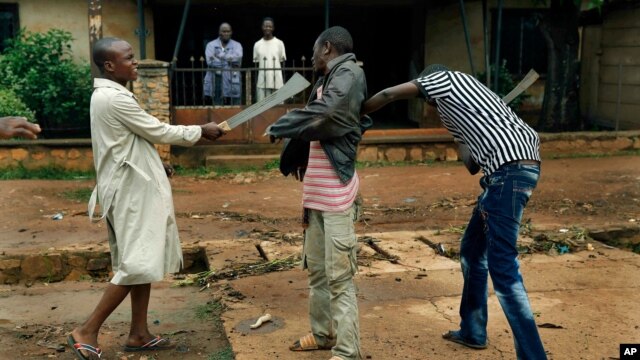HRW: Crises in South Sudan, CAR, Provoke Abuses
|
|
Date: 1/21/2014 8:31:22 PM
Sender: VOA
|

FILE - Muslim men organized in militias with machetes rough up a Christian man while checking him for weapons in the Miskine neighbourhood of Bangui, Central African Republic, Dec. 13, 2013.
JOHANNESBURG — Crises in South Sudan and the Central African Republic led to some of the worst human rights abuses in Africa last year, says New York-based Human Rights Watch in its annual report. The report, released Tuesday in Johannesburg, also found that gays and lesbians are under severe threat in several countries.
Violence and gross human rights abuses in South Sudan and the Central African Republic top what human rights advocates say has been a “worrying” year for human rights in Africa.
A rebel coalition took control of the capital of the Central African Republic in March, forcing out the president. That coup opened the door for rebels -- among them, forcefully recruited child soldiers - to commit widespread rights abuses and indiscriminate killing of civilians.
South Sudan also saw bloodshed and rights abuses in its second full year of independence. In December, violence erupted when President Salva Kiir accused his former deputy Riek Machar of attempting a coup, a charge Machar has denied. Since then, the conflict has spiraled into a mix of military clashes and ethnic violence that has displaced an estimated half-million people.
A senior U.N. human rights official said Monday that “thousands” of people have been killed in the violence and some of the rights violations may constitute war crimes and crimes against humanity.
Tiseke Kasambala, Southern Africa Director at Human Rights Watch, called on forces in South Sudan to bring the conflict under control.
“We are calling on commanders to take necessary measures in the South Sudan to ensure their forces act in accordance with humanitarian law and take appropriate and prompt disciplinary action against those members who commit violations,” said Kasambala.
Kasambala also cited impunity as a problem on the continent, condemning the African Union for trying to protect Kenya’s president from prosecution at the International Criminal Court for his alleged role in orchestrating violence after Kenya's 2007 presidential election.
And across the continent, rights advocates said, things seemed to be getting worse for gays, lesbians and transgendered citizens.
Graeme Reid, the organization’s Lesbian, Gay, Bisexual and Transgender (LGBT) Director, said the governments of Cameroon and Uganda were among the worst offenders when it came to gay rights. He also described Nigeria’s recently passed law prohibiting same-sex marriages as “a dangerous piece of legislation.”
“Organizations are lobbying for social space for the rights of the LGBT people, legal reform access to social services and for attitudinal change, and I think what we see is a backlash against that,” he said.
Reid also offered criticism for South Africa, the only nation on the continent that allows gay marriage and constitutionally protects the rights of gays and lesbians. He said South Africa has failed in many instances to protect this population against attacks and to prosecute homophobic crimes.
Kasambala also noted that while South Africa’s constitution was widely regarded as exemplary for its human rights protection, police brutality remained a cause for concern.
In 2012, South African police shot and killed 34 miners who held an illegal strike. Kasambala said that was hardly the only instance of police misconduct.
“The recent event in which two people were killed and one was allegedly thrown from the police vehicle is an increasing, disturbing pattern of violent police conduct in South Africa and this is something that needs to be seriously addressed in the coming year,” said Kasambala.
The 667-page World Report reviews human rights practices in more than 90 countries, and calls on governments to end the culture of impunity and prioritize the protection of the rights of all their citizens.
|
|
| |
